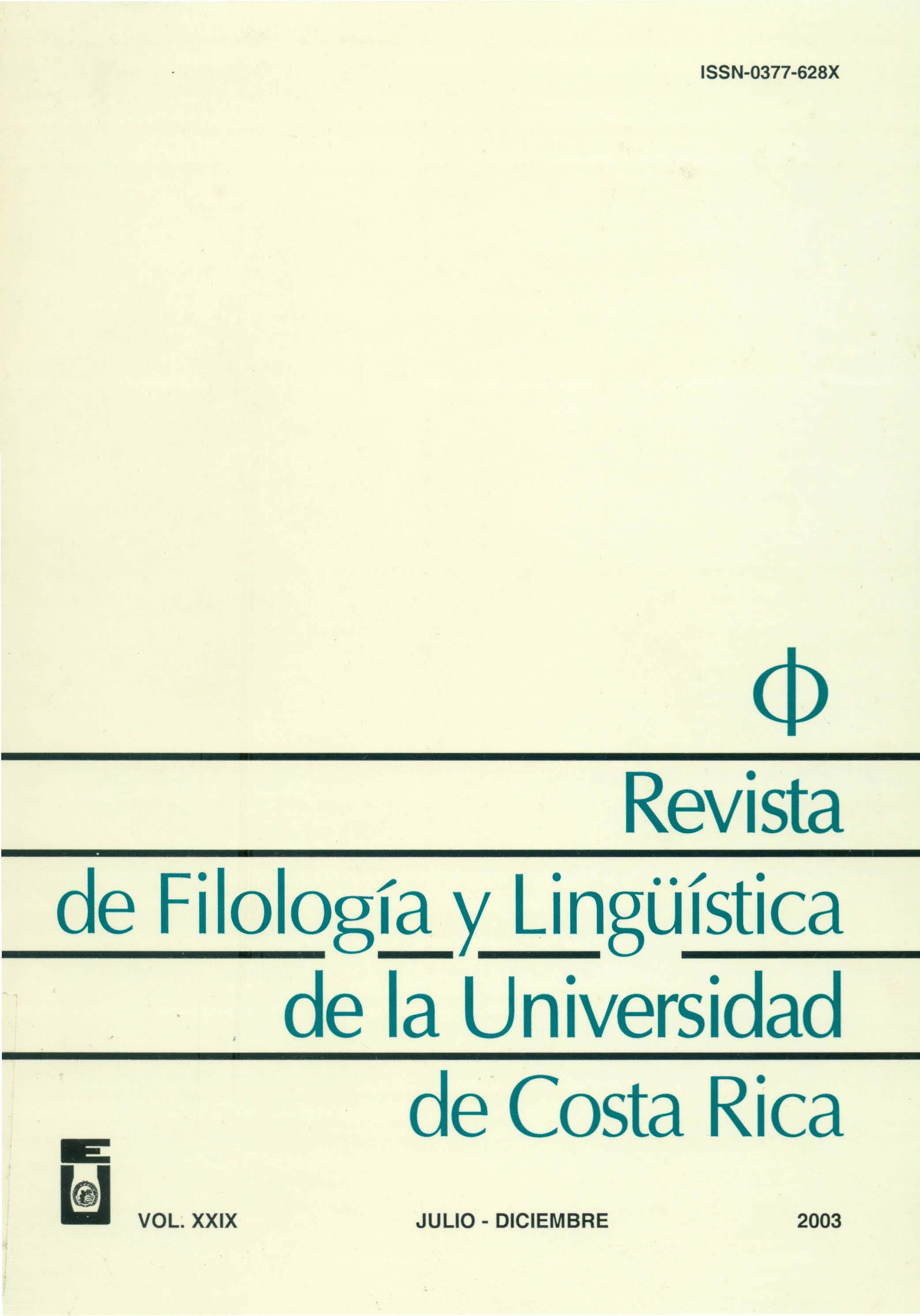Abstract
The transformation from human being to stone suffered by Isabel at the end of the novel, must be interpreted in a negative way, since the personal failure brings consequences for the whole collective. We have to remember that getting into stone is a curse sign within the symbolic-mythic thought. Then, Isabel's death-sentence works as the angular stone of the longed purification needed by the Ixtepec society in order to neutralize the divine punishment, and invoke the story continuity of the endemic but collective failure. Isabel is the necessary victim found by Los recuerdos del porvenir, in order to fulfill the social evils and neutralize the current crisis.
References
Anderson, Robert K. 1981. "La realidad temporal en Los recuerdos del porvenir". Explicación de Textos Literarios. 9 (1): 25-9.
Birminghan-Pokorny, Elba. 1996. "La Malinche: A Feminist Perspective on Othemess in Mexican and Chicano Literature". Confluencia. 11 (2): 120-36
Boschetto, Sandra. 1989. "Romancing the Stone in Elena Garro's Los recuerdos del porvenir". The Journal 01the Midwest Modern Language Association. 22 (2): 1-11.
Chen Sham, Jorge. 1998. "Del ceremonial hacia la víctima expiatoria: la dramaturgia española hacia la transición (Martín recuerda y Rodríguez Méndez)". Théiitre, Public, Société (Actes du Illé Colloque lnternational sur le théátre hispanique, hispano-américain et mexicain en France, 10, 11 et 12 octobre 1996, Université de Perpignan). Perpignan: Presses de l'Université: 100-7.
Chevalier, Jean y Alain Gheerbrant. 1995. Diccionario de los símbolos. Barcelona: Editorial Herder, 5a. edición.
Cros, Edmond. 1983. "Formation idéologiques et formations discursives dans le Mexique contemporain". Théorie et Pratique Sociocritiques. Montpellier: Éditions du CERS: 225-78.
Cypress, Sandra M. 1990. "The Figure ofLa Malinche in the Texts ofElena Garro". A Different Reality: Essays on the Works 01 Elena Garro. Anita K. Stoll (Ed.). Lewisburg: Bucknell UP: 117-35.
Dauster, Frank. 1980. "Elena Garro y sus recuerdos del porvenir". Journal 01Spanish Studies: Twentieth Century. 8 (1-2): 57-65.
Duncan, Cynthia. 1992. "Time and Memory as Structural Unifiers in Elena Garro's Los recuerdos del porvenir". Journal of Interdisciplinary Literary Studies. 4 (1-2): 1-53
Eliade, Mircea. 1986. Tratado de historia de la religiones. Barcelona: Editorial Herder, 5a. edición.
Garro, Elena. 1985. Los recuerdos del porvenir. México, D.F.: Editorial Joaquín Mortiz y Secretaría de Educación Pública.
Girard, Réné. 1978. Des choses cachées depuis lafondation du monde. París: Bemard Grasset.
Le bouc émissaire. París: Bemard Grasset.
Krakusin, Margarita. 1999. "Reconstrucción de una heroína: Pancha Carrasco reclama a Leda Cavallini y Lupe Pérez". Káñina, Revista de Artes y Letras de la Universidad de Costa Rica. 23 (1): 9-15.
León Vega, Margarita. 1992. "Elena Garro: el discurso social en Los recuerdos del porvenir". Literatura Mexicana 3 (2): 387-415.
"La experiencia del tiempo y del espacio en la novelística de Elena Garro". La mujer y su representación en las literaturas hispánicas. Juan Villegas (Ed.). Irvine: The University of California Press: 205-11.
Mandrell, James. 1992. "The Prophetic Voice in Garro, Morante, Allende". Comparative Literature. 42: 227-46.
Muncy, Michele. 1985. "Perseguidos y perseguidores: El juego de la violencia en la obra de Elena Garro", Hispanic Joumal. 7 (2): 308-18.
Paz, Octavio. 1959. El laberinto de la soledad. México, D.E: Fondo de Cultura Económica.
Pulido Rosa, Ma. Isabel. 1998. "Adaptaciones de un motivo literario: la salamandra". Anuario de Estudios Filológicos. 21: 307-18.
Soustelle, Jacques. 1972. La vida cotidiana de los aztecas. la. reimpresión. México, D. E: Fondo de Cultura Económica.
Stoll, Anita. "Elena Garro". 1990. Escritoras de Hispanoamérica: Una guía bio-biográfica. Dianne E. Marting (Comp.). Bogotá: Siglo
Veintiuno Editores: 203-14.

